Namibia’s liberation movement is quickly losing ground
At the first cabinet meeting of 2020, on 4 February, Namibian president Hage Geingob, in a custom he had started in his first full year in office in 2015, titled the political year as the “Year of Introspection”.
It was supposed to herald a period of self-reflection, not just for Geingob’s cabinet or government, but also Namibia’s ruling party, Swapo, of which Geingob is also the president.
In tune with this theme of self-reflection, in the wake of the November 2019 National Assembly and presidential elections, the ruling party also adopted a slogan: “We have heard you”.
This was in response to the outcome of the late 2019 elections, from which the party had emerged bruised and stunned, very narrowly losing its generation-old, two-thirds majority in the National Assembly. The presidential candidate, the incumbent Geingob, scraped through a win at the polls by just 56%, having seen off the challenge of a Swapo party member, Panduleni Itula, who had stood as an independent.
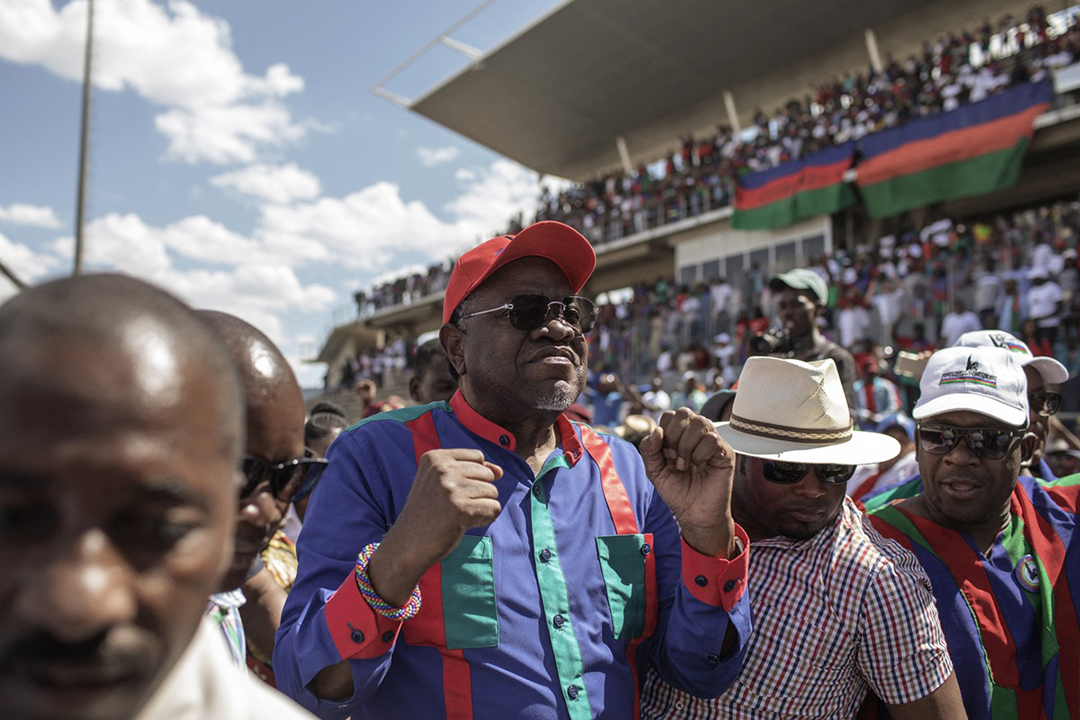
Namibia’s current President and the ruling South West Africa People’s Organisation (SWAPO) presidential candidate Hage Gottfried Geingob (C) arrives to address an election rally on 23 November, 2019 in Windhoek, Namibia. Photo: Gianluigi Guercia/AFP
It was certainly a significant political moment in independent Namibia’s history; just over five years earlier, following the November 2014 National Assembly and presidential elections, the ruling party had seemed well on its way to permanently entrenching its rule. Then, the party had garnered 80% of the popular vote, with Geingob attracting a resounding 87% support. At that point, it appeared that opposition politics was on the fast-track to death through democratic means.
Then, from 2015, followed five years of sharp national economic deterioration, a prolonged and devastating drought, a string of high-profile corruption and mis-governance scandals, and political inertia and ineptitude in decisively dealing with the myriad challenges confronting the Namibian state and society. By early February 2020, Swapo faced the previously unimaginable, but suddenly very real prospect of losing power come the November 2024 national and presidential elections.
At that point, many political commentators (including this one) were still somewhat cautious of reading too much into the shifts unfolding on the Namibian political landscape, warning that the outcome of the November 2020 local authorities and regional councils elections would tell whether the previously unimaginable was happening – that Swapo was in steep and probably irreversible decline.
Then COVID-19 happened, exacerbating economic hardship for many and throwing years of neglect of significant state and socio-economic sectors into stark relief. By the time the regional and local elections rolled by in November 2020, the impression had firmed up that the once omniscient-seeming and insurmountable political force that had seeped into every socio-economic and political aspect of Namibian society since 1990 was in a state of rapid demise.
In these elections Swapo, which until November 2020 had firmly controlled all 14 regional councils, lost four regions – including the economically significant !Kharas and Erongo regions – to opposition parties and managed only 57% of the cross-regional vote share. Across local authorities, the ruling party only managed to attract 40% of the votes, including losing the Namibian capital, Windhoek, to a coalition of opposition parties.
A year earlier, the multi-billion dollar Fishrot bribery scandal, ensnaring Geingob’s justice and fisheries ministers and an assortment of ruling party associated businesspeople, erupted just as the final stages of campaigning for the 2019 elections were winding down.
The Fishrot scandal involved an Icelandic fishing company, Samherji, which had allegedly bribed senior Namibian ministers and state-owned enterprises officials for almost a decade to manipulate lucrative fishing quota allocations.
The scandal unfolded throughout 2020, eventually also implicating Geingob and other senior leaders of the ruling party. As the sordid details of possibly the largest corruption scandal in Namibian history continued to emerge, it was clear, judging by the volume of disillusioned and vitriolic comments on social media, that for many Namibians the “we have heard you” slogan rang hollow.
“The first weakness Swapo leadership would have to tackle is the corruption they have allowed to develop within their own ranks,” says Graham Hopwood, executive director of the Windhoek-based Institute for Public Policy Research (IPPR).
“Fishrot is but the most prominent and costly of a range of scandals. How far corruption is embedded in Swapo is hard to say, but the fact that many in the leadership are so defensive and reluctant to take action would tend to indicate that many near the top of the party are connected in some way to corrupt activities, even if it is only persistently turning a blind eye to what their comrades are doing.”
For Hopwood the other challenge for the ruling party is to disentangle itself from its capture of the Namibian state, which has allowed maladministration, corruption and poor service delivery to become endemic over recent decades.
“At one point those near the top thought they could maintain the loyalty of the masses by running a huge patronage network,” Hopwood says. “Key parts of this are the civil service and state-owned enterprises. However, a bloated civil service is no longer sustainable and continuously bailing out failing SOEs is also no longer viable.”
Hopwood thinks there is still room for the party to self-correct but added that there didn’t appear to be political will among the party leadership for such an exercise. “If a critical mass of people in decision-making roles in the party do not grasp these issues soon, then they are likely to be out of power within 10 years or have to turn to authoritarian and non-democratic means to retain power,” he says.
Such tendencies are already evident. Hardliners within the Swapo leadership, notably Defence Minister Peter Vilho, seized the opportunity to issue veiled threats to unnamed political foes from prominent public platforms in 2020.
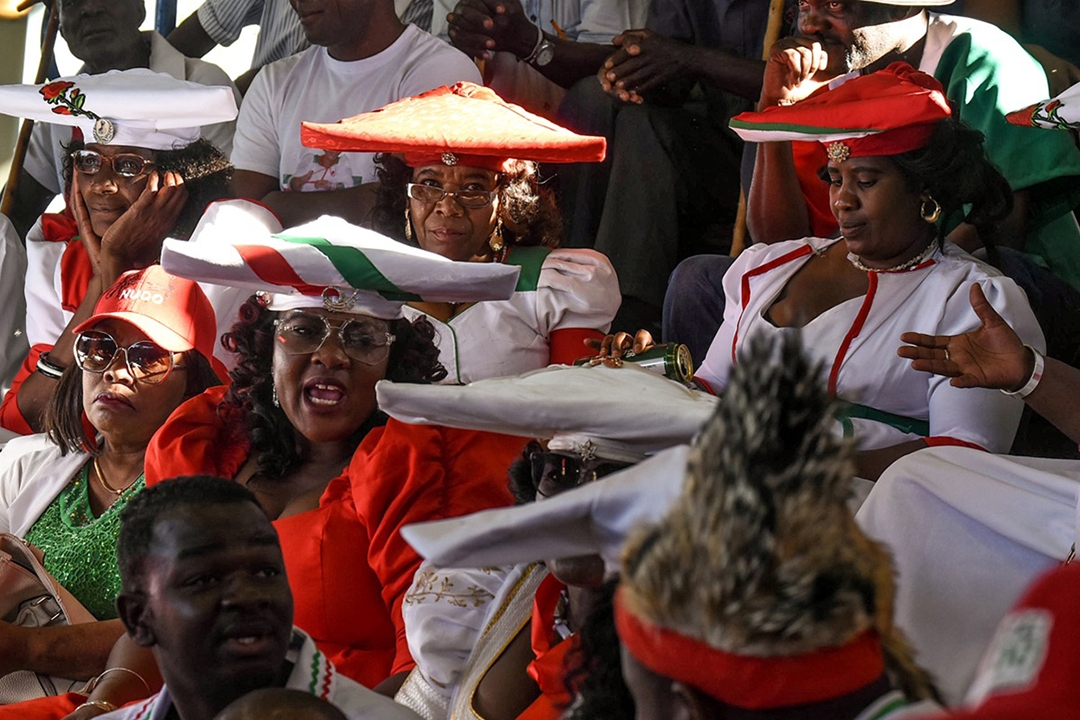
Namibian party National Unity Democratic Organisation (NUDO) presidential candidate supporters dressed in Herero traditional clothing attend a campaign rally at the UN plaza on 23 November 2019 in Windhoek. Photo: Hildegard Titus/AFP
By the latter half of 2020, with local and regional elections fast approaching, it was clear that deflecting blame and scapegoating unidentified saboteurs for the state of the party had become the preferred response to growing outrage among party members and the public.
On 16 September, 2020, Namibia’s deputy prime minister and minister of international relations and cooperation, Netumbo Nandi-Ndaitwah, rose in the country’s National Assembly and blamed unnamed “detractors” using social media to “instigate our citizens” to create political and economic instability.
The blame-shifting has been unconvincing, however, and internal party factional skirmishes have grown increasingly brutal and divisive since November 2019. The party has been riven by factional fights for most of the past 20 years, but now divisions have reportedly hardened.
Party members opposed to Geingob’s tarnished leadership are openly calling for a Swapo government to be recalled, following the party’s weakened hold on power since the 2019/20 elections and the corruption and leadership scandals.
In late January 2021, a group called the Namibia Exile Kids Association (NEKA), with strong links to some party elders and made up of children of former liberation fighters, publicly called for the “ship to sink” and for the entire party leadership to be sacked.
“They must all go,” NEKA chairperson Benita Nakaambo was quoted saying. However, while many party members are deeply unhappy, only a very few, such as Nakaambo, have been willing to speak up, and even fewer appear to have the stomach to step forward and openly challenge Geingob’s hold on the party.
That is because anybody who is anybody in the party has been compromised over the years, according to Naita Hishoono, executive director of the Namibia Institute for Democracy (NID), who describes herself as a “child of the party” with ties to many party elders.
“The view is that something needs to happen, someone needs to step up,” says Hishoono, who is part of a WhatsApp group that includes former and current leaders in the party and senior party cadres in the civil service, the police and security establishment.
“The issue is, if you know you are part and parcel of any rot, then of course you can’t step up,” she says. “So, the party is asking for people to step up that are clean. But who would that be?”
For Hishoono the answer is the youth, but she points out that all the most promising young party members have either been discouraged and left the party or been thrown out over the years. Many young people with potential were simply not interested in joining the party’s card-carrying ranks, due to a toxic leadership culture that has long permeated its structures.
Everyone interviewed for this article pointed to the ruling party’s 2022 congress, at which Geingob’s successor will be picked, as the defining event that will determine the direction of both the party and the country following the 2024 and even 2029 elections. Hishoono said she fully expected the congress to be “a bloodbath”.
Similarly, everyone interviewed did not feel confident in the ability of opposition parties to capitalise on Swapo’s weaknesses.
“There are no really viable alternatives. There are no real leaders of any gravitas emerging,” says Gwen Lister, chairperson of the Namibia Media Trust (NMT) and former editor of The Namibian newspaper, who also has longstanding ties with many Swapo leaders. “Really, you’d be hard pressed if you were asked today to identify role models in the political sphere. Everyone seems to be tainted or compromised in some way or another, including the opposition. They don’t have the credibility.”
Even so, in the final analysis, regardless of what happens, Swapo seems doomed to deteriorate, for as the IPPR’s Hopwood notes: “Someone [in the party] said to me recently that ‘the Titanic has already hit the iceberg, it’s only how quickly or slowly it sinks that’s the question’.”
Frederico Links is a Namibian journalist, editor, researcher, trainer and activist. Research associate of Namibia’s Institute for Public Policy Research (IPPR). He is primarily concerned with democracy and governance, particularly corruption and maladministration. He is chairperson of the Access to Information in Namibia (ACTION) Coalition of civil society, media and social activists.


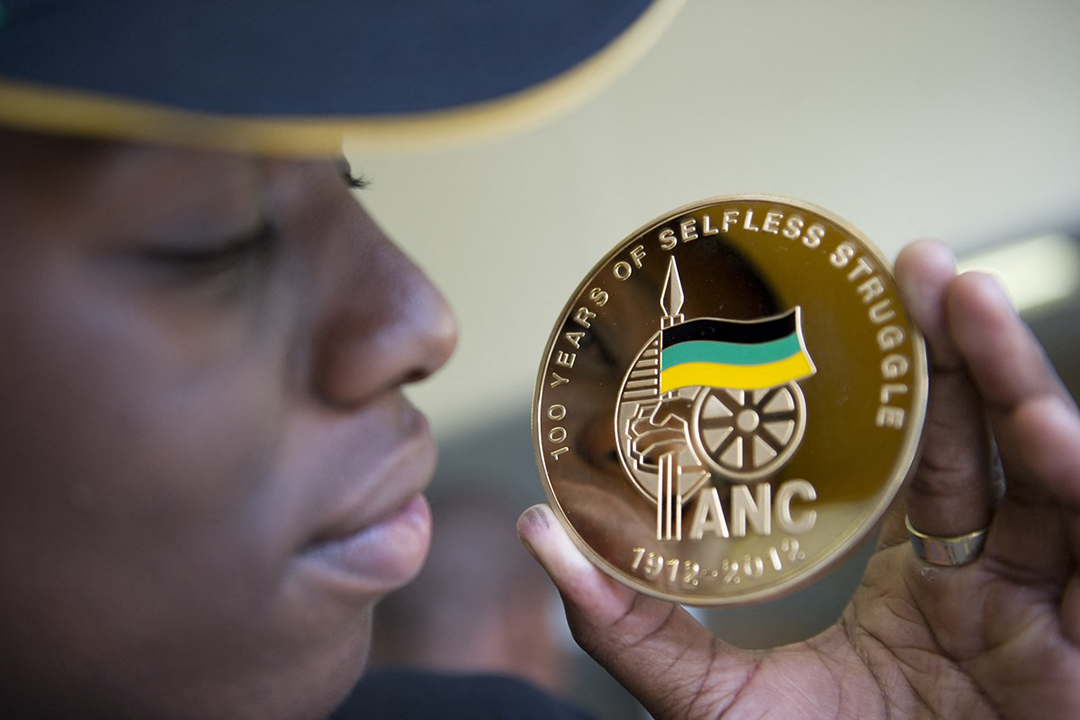
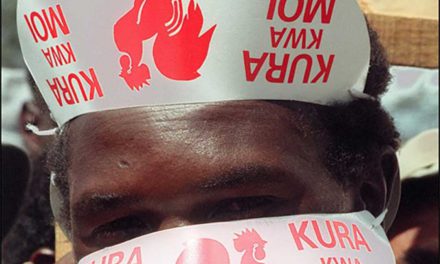
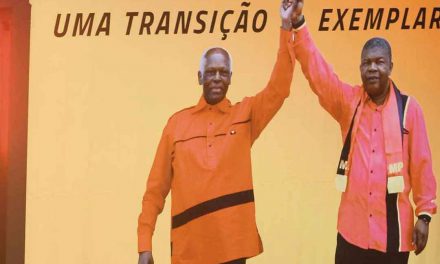
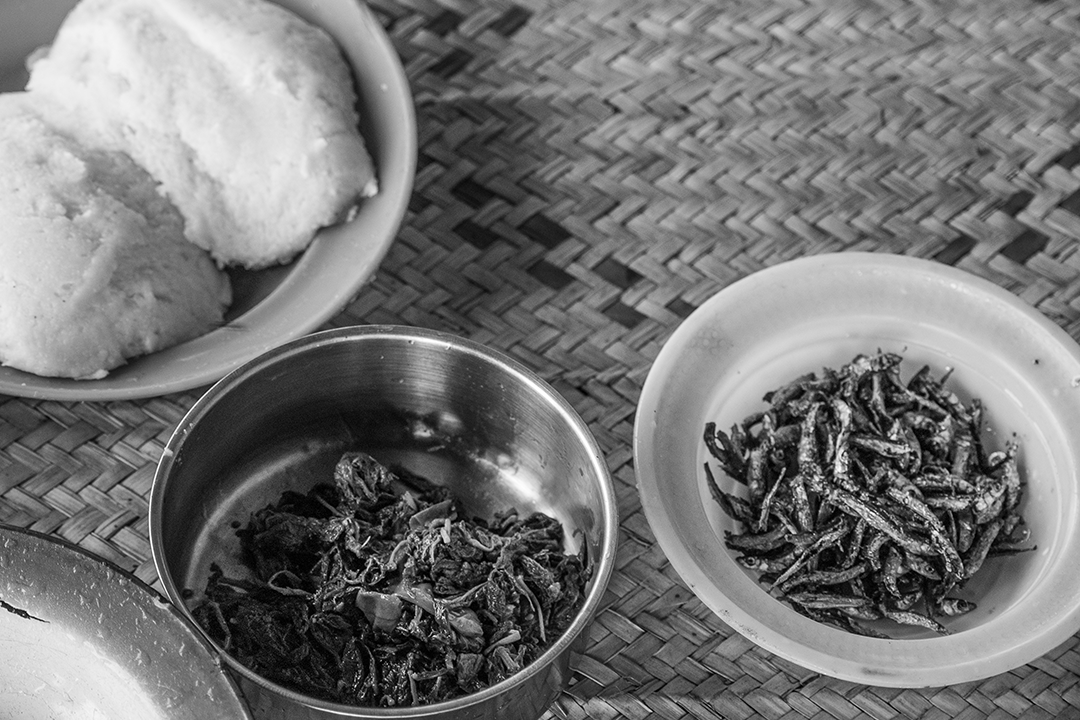







Very interesting and comprehensive